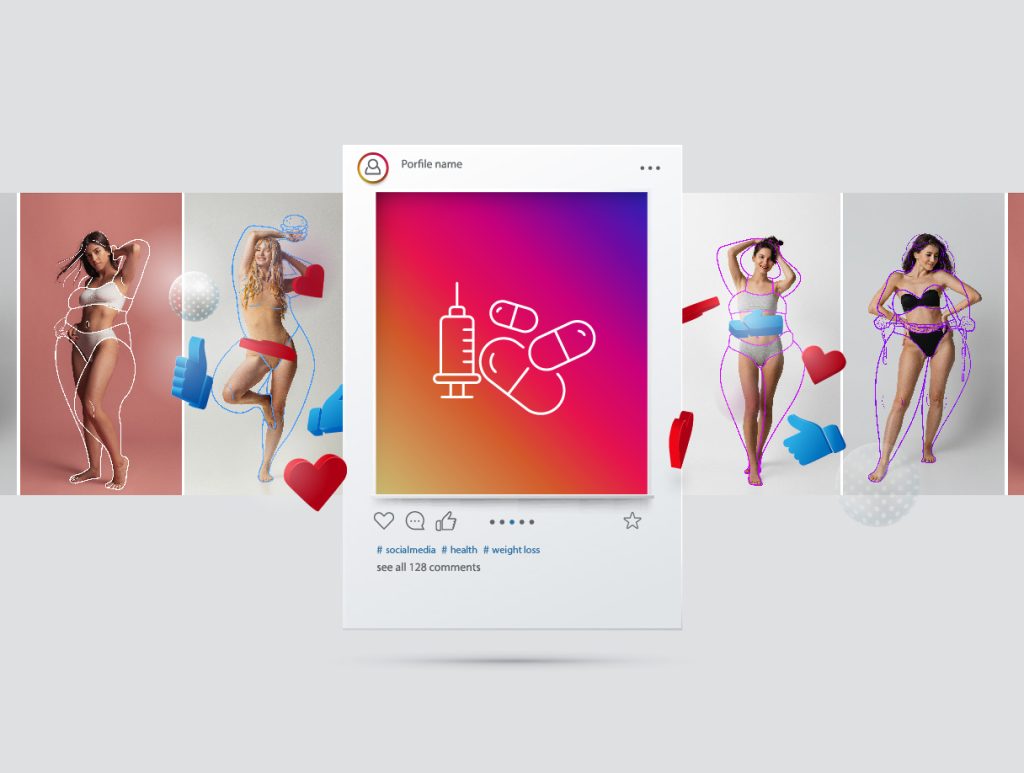
It often happens while I’m scrolling on social media, an ad for a magically fat loss product pop out of nowhere. I assume you’re nodding and saying, “I know, right? it happened to me, too as well.” Social media can enter our minds and trigger any mental illness or insecurity. The use of photoshopped images of a perfectly shaped body that these companies put on those products to promote is so powerful. To the extent that they can make a healthy human being go unhealthy and use this product. However, what if I told you that the pharmaceutical industry had found a way to capitalize on this negative impact, using social media to promote new drugs and drive sales? By tapping into our insecurities and offering solutions to our perceived flaws, these companies are creating a demand for their products. Scroll down, and let’s reveal the dark side of social media and how it affects our self-image and the aspirational images that drive new drug sales.
The Promotional Power of social media
People believe and follow what they see. If you put a fit person on a tea pack, people will eventually desire to look like the picture. Therefore, people will link buying and drinking the tea with getting the body on the pack. Despite the negative impact of social media on our self-image, it remains a powerful tool for promoting new drugs and driving sales. The aspirational images that dominate social media create a desire to achieve the same level of success and beauty that we see online.
Pharmaceutical companies can tap into this desire by promoting their products as the key to achieving these aspirational goals. For them, this negative impact on self-image can be leveraged to drive sales of new drugs. By tapping into our insecurities and offering solutions to our perceived flaws, pharmaceutical companies can create a demand for their products. For example, weight loss drugs or skincare products may be marketed as solutions to body dissatisfaction and appearance-related comparisons exacerbated by social media. Furthermore, Big Pharma, has increasingly utilized social media platforms as a powerful weapon to promote their products and influence public opinion. Through targeted advertising, influencer marketing, and the use of sophisticated algorithms, pharmaceutical companies have been able to bypass traditional regulatory barriers and create a culture of unregulated drug promotion on social media.
One of the most alarming aspects of Big Pharma’s use of social media is the manipulation of public health concerns for profit. Companies often use fear-mongering tactics to convince consumers that they need their products, even when there is little evidence to support their claims. By leveraging the power of social media algorithms, pharmaceutical companies can target vulnerable individuals and groups, such as those with chronic health conditions or mental health disorders and bombard them with targeted advertising and messaging.
Elon musk revealed the medicine he has used that made him lose weight. Two months later, the medication was, not surprisingly, out of stock. This medicine turned out to be a diabetes drug injection, which welcomes fatal side effects in an open arm. One of the side effects is Hyperglycemia (low blood sugar) which triggers diabetes in the long or short run. Another side effect can be psychological, which makes the person develop an unhealthy relationship with food and triggers food disorders.
The Cost of Comparison
Let’s agree on something; you will never look like the photoshopped model because this model you saw seems way different in real life than her photoshopped picture. Many celebrities on social media are unaware that their photoshopped unrealistic images are promoting a lot of mental disorders, especially for teenagers and young youth. For example, if you look at the waist of some celebrities, as an adult, you will automatically think: where did her entire organs go? How do they fit in such a small waist? However, As a teenager, I would have thought that this is how my body should look, and I would have hated my natural body and started developing a very unhealthy relationship with food. Eventually, this will lead to buying any promoted weight loss product I see.
Not to forget, the filter features on Instagram that changes the whole face. People you see using those filters don’t look like themselves in real life, as they look completely different.
Moreover, promoting smoking is banned on social media because it promotes unhealthy habits. What about the psychological and health side effects of fat loss medication? Of course, they ignored them for a couple of billion dollars.
Why don’t they promote videos that normalizes cellulite, pimples, bloated stomach, and stretch marks instead of promoting unhealthy medications under an unrealistic image? The answer is right in front of us; if those things are normalized, then their work efficiency will decrease because people will stop caring what their bodies will look like. Therefore, all the promoted ads will be inefficient and unsuccessful.
Final Thoughts
In the age of social media, it’s easy to get swept up in the aspirational messaging and upward comparisons that bombard us every day. However, we must remember that the images and messages we see online are often carefully curated and heavily filtered, presenting an unattainable ideal that can leave us feeling inadequate and unhappy with ourselves. While new drugs and marketing campaigns may promise to help us achieve these unrealistic standards, the true solution lies in embracing our individuality and finding contentment in our skin rather than constantly striving for an unattainable image.
Inside Telecom provides you with an extensive list of content covering all aspects of the Tech industry. Keep an eye on our Medtechsection to stay informed and updated with our daily articles.